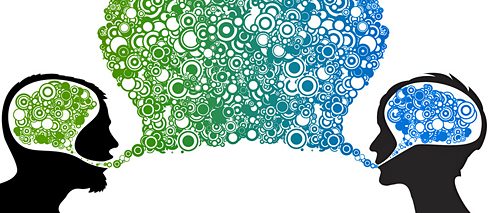Language Research
Word nets in our heads

Why do we often already know what our interlocutor wants to say before he has finished his sentence? How is it that we understand many terms even when we hear them for the first time? And what importance does this have for learning and translating foreign languages?
In school we already learn that there are nouns, adjectives and verbs, and that new German words are created by compounds and by borrowings from other languages – at the latest, when we attempt an English translation of “Elektrorasenmäher” (electric lawn mower) or want to explain how the coinage “whatsappen” (whatsapping) has conquered our language. That greetings and other expressions often combine words with certain other words is a fact known not only to linguists. If someone begins a sentence with “either”, we immediately wait inwardly for the “or”. And when we hear the verb “bake”, we think automatically of a cake. But our vocabulary is much more dynamic and complex than is usually assumed. That is the conclusion arrived at by the Mannheim Institute for German Language (Mannheimer Institut für Deutsche Sprache / IDS) at its annual conference in March 2017.
Guessing what others will say
Analysing transcripts of conversations, language researchers were able to observe that listeners often interrupt their interlocutors and complete their sentences. In order to better understand those who are talking to us, the scientists conjecture, we assiduously guess what the other will say next. “When we begin a sentence with the subject ‘The tram’, we expect a movement to be described. That’s why we understand a sentence such as ‘The tram squeaks round the corner’ even though no verb of movement is used”, explains Professor Ludwig M. Eichinger, Director of the IDS. Words thus condition each other reciprocally, so that beginnings of sentences trigger certain expectations of their sequel. “Words aren’t set like rigid elements into a sentence structure; they are networked with each other. Our memory is organized like a network where the words that belong to a state-of-affairs are stored”, says Eichinger. Certain words therefore often appear in connection with others, and we can play marvellously with the resulting expectations. In developing new words and expressions, we extend existing structures and patterns. “Since the successful film Ziemlich beste Freunde [The Untouchables; literally, Rather Best Friends] was shown at the cinemas, we speak of ‘rather best’ partners, neighbours or trainees,” Eichinger observes.Understanding words without knowing them
This also explains why we can derive the approximate meaning of many words even if we use only a fraction of them actively. “Fifteen years ago, a ten-volume Duden dictionary comprised about 200,000 entries. Today, thanks to new computer programmes, we have the possibility of riffling through larger quantities of words. We can see that languages such as German have about five million words. Relatively few of them occur very frequently and very many occur rarely. Nevertheless, we usually understand them because we orient ourselves to the context in which they appear”, explains Eichinger. The listener can understand a new word like “kids” instead of “children” without further explanation thanks to the overall context. In definitions, we again provide the context needed to understand a word by means of other words that the listener ideally already knows.Word-networking in learning and translating foreign languages
Teachers of and textbooks for German as a foreign language have been working for decades with the networked structure of our vocabulary by introducing words not in isolation but rather in contexts. New is that now large electronic corpora can be used in teaching to examine, for example, the use of certain verbs. “Electronic resources such as the Online German Vocabulary Information System (Online-Wortschatz-Informationssystem Deutsch / OWID) of the IDS, based on the German Reference Corpus DeReKo, the Berlin-Brandenburg Academy’s Digital Dictionary of the German Language and the Vocabulary Portal of the University of Leipzig are freely accessible all over the world and afford new opportunities for working on vocabulary”, says Eichinger.In addition to language learners, this can benefit translators because it is rare that there is only one appropriate match for a term. “The French word ‘fleur’, for instance, can be translated into German as ‘Blume’ [flower] or ‘Blüte’ [blossom]. Electronic dictionaries provide information about such possible uses of words”, says Eichinger. In general, he adds, German is more precise than many other European languages because of its possibility of building compound words.